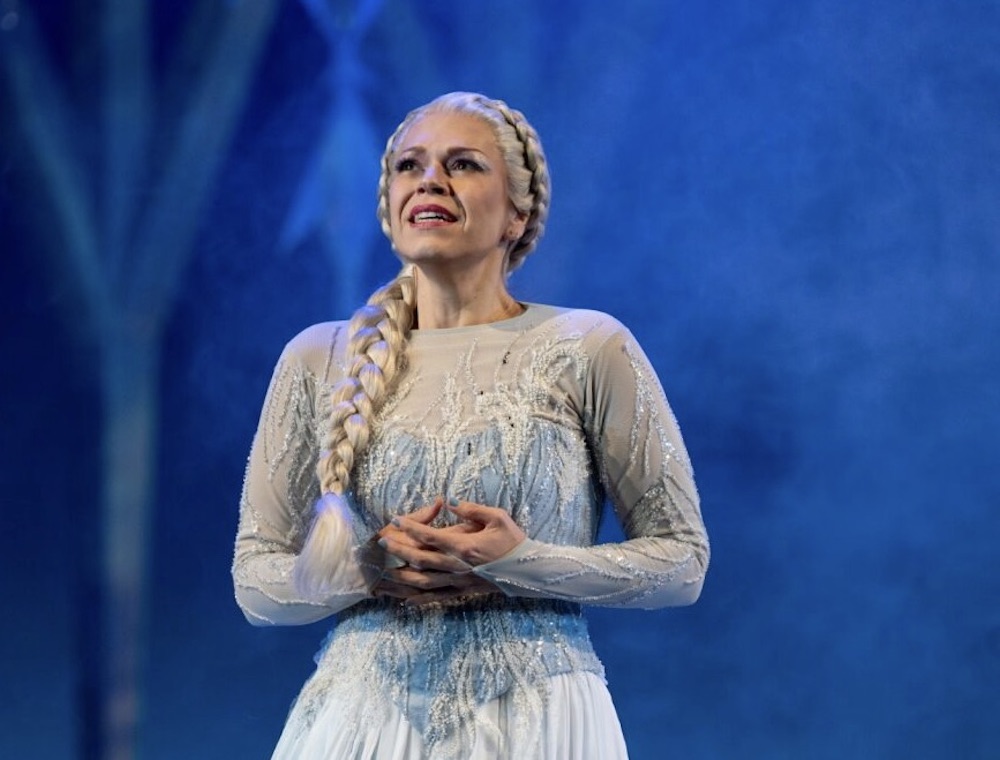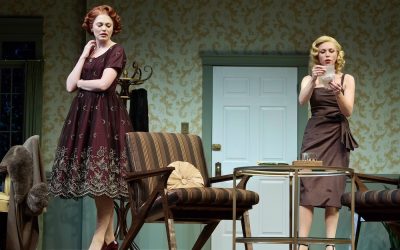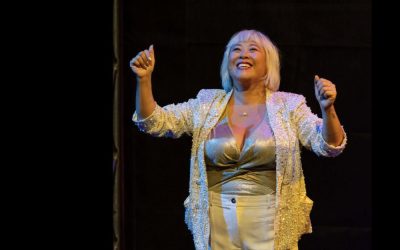Disney’s Frozen, The Broadway Musical is as commercial and superficial as it sounds.
It’s also incoherent, which is worth talking about. Because the show’s symbolism is a mess, it doesn’t make sense thematically.
Jennifer Lee based her book for the musical on the script she wrote for Disney’s animated film. At the heart of the story, there’s a traumatic rift between two royal sisters. Elsa, who’s in line to become Queen of the mythical realm of Arendelle, possesses the magic ability to turn things to ice — but she doesn’t know how to control her gift and she almost freezes her younger sibling Anna to death. Terrified of causing more harm with her magical hands, Elsa wears gloves and, emotionally, she freezes Anna out — without telling her why. (Anna has no memory of the accident.)
So, in broad terms, we’re talking about female power — and the fear of it. Elsa’s parents, the King and Queen, insist on suppression. And one of the baddies of the piece, the Duke of Weselton (pronounced “Weaseltown” by his opponents), makes the musical’s theme explicit by stating its opposite. “No good ever came from magic” he says, “especially in the hands of a woman.”
So we’re set up for a musical that will, ultimately, celebrate the glories of female magic. But Frozen repeatedly fails to deliver on its promise.
In Elsa’s big number, “Let It Go”, she embraces her power, unleashes it — and the results are disastrous: she throws the entire kingdom into endless winter, and ends up isolated in a glittering palace of ice.
In the final resolution of the sisters’ estrangement: Elsa apologizes. That’s it. Of course, she needs to come clean with her sister. But, surely, there needs to be more to the resolution of the supposed problem of female power than an apology. Where’s the glory on the other side of the fear? Where’s the good that comes from female magic? Frozen has no idea how to answer its central question.
And, while we’re at it, what’s the core meaning of Elsa’s power to freeze? What specific aspect of female capacity does the freezing represent? Looking at the musical, I’d say it’s about her ability to shut down emotionally. Great. Fantastic statement about feminine strength: it’s something to be overcome.
I’ll be quick about the rest of it, but there are more reasons that Frozen, the musical, feels hollow to me: the characters and their relationships are unidimensional; and, stylistically, this piece is a grab bag.
The design and some of the names — Sven, Olaf, Kristoff, and so on — hint at Scandinavian roots and a possible connection to Hans Christian Anderson’s story “The Snow Queen”, but these references are at odds with — and completely swamped by — the musical’s Broadway bombast, which is particularly apparent in numbers like “Monster” and “Let It Go”.
Suddenly, in “Hygge” at the beginning of Act 2, we slip from North American accents —Arendelle sounds like it could be New Westminster — into a thickly Ikea-accented parody of Scandinavia. What? I know we’re supposed to be slightly north of Arendelle at this point, but the shift makes no sense.
Still, there are a bunch of talented performers in this Arts Club production. Although she’s supposedly the central character, Elsa doesn’t have much to do besides being tormented. Still, playing her, Chelsea Rose Winsby is in fine, powerful voice, as is Kamyar Pazendeh in the role of Kristoff, the ice seller. Synthia Yusuf is singing her heart out and having a good time as the klutzy Anna. Daniel Curalli delivers, as he always does, playing the dashing Hans, one of Anna’s love interests.
These folks are all familiar pros. I also enjoyed seeing Joaquín Little for the first time: he brings a charming combination of innocence and comic shops to his performance as Olaf, the snowman, whose very existence is, to say the least, arbitrary. And, working his way up the performance ladder, Jacob Woike has an infectiously good time as Oaken, who leads the nonsensical “Hygge”.
Of course, if you ask me, the whole musical is nonsensical. Kids and their families — all theatregoers — deserve more from their entertainment, and I worry that, increasingly, our artistic and media environments are training us to value superficiality over substance: in their melodrama and relentless musical escalation, Elsa’s big numbers make her sound like she’s auditioning for America’s Got Talent.
Still, judging by the massive success of Disney’s Frozen, millions would disagree with me. Fair enough.
DISNEY’S FROZEN, THE BROADWAY MUSICAL Book by Jennifer Lee. Music and Lyrics by Kristen Anderson-Lopez & Robert Lopez. Directed by Ashlie Corcoran. An Arts Club Theatre production at the Stanley BFL Canada Stage until January 4. (Tickets and information)
PHOTO CREDIT: (Chelsea Rose Winsby as Elsa in Frozen. Costume by Alaia Hamer. Photo by Moonrider Productions.)
THERE’S MORE! You can get all my current reviews PLUS curated local, national, and international arts coverage in your inbox FREE every week if you subscribe to Fresh Sheet, the Newsletter. Just click that link. (Unsubscribe at any time. Super easy. No hard feelings.) Check it out.






Soooo, what was the show actually like? Because there’s a lot about the script and base material but basically nothing about the Arts Clubs execution of the script.